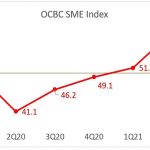You don’t have to wait until you sell your house to refund CPF monies you used to buy it

Central Provident Fund (CPF) monies play a large part in the way most Singaporeans fund the purchase of public housing properties. Most buyers who are planning to purchase a Housing Development Board (HDB) flat would look at how much CPF grants they may be eligible for and may dip into their Ordinary Account (OA) savings to fund the downpayment or monthly mortage instalments for the purchase of their flat.
But using CPF monies for housing comes with a catch: when you decide to sell your house, you need to refund the amount you used from your CPF, with an additional interest of 2.5 per cent accrued interest, back into your OA.
What many homeowners may not know is that you don’t need to wait until you sell your house to refund CPF monies back into your OA.
And if you have the cash on hand, it may be quite beneficial to refund CPF monies as early as you can. You won’t have to shell out as much to pay the accrued interest back into your account and you will be able to earn interest yourself when the monies are returned to the OA.
Refunding CPF monies can be done anytime through the CPF Voluntary Housing Refunds scheme and any CPF member can make partial refunds or a full refund. The CPF Board revealed that close to 15,000 Singaporeans have made voluntary housing refunds last year alone.
Before you make a voluntary housing refund, you need to find out how much accrued interest you owe. This information can be found on the CPF website. All you need to do is:
1. Log in to your CPF account.
2. On the homepage, click “My Statement”.

3. Scroll down to “Section C”.
4. Under the “Property” section, you can find the net amount used and accrued interest. The sum of the net amount used and accrued interest is the amount to return to your CPF account when you sell your house.

Stay logged in to the CPF website to make a voluntary housing refund. You need to:
1. Go to the “My Request” section and click on “Property”.

2. Click on “Make a Housing Refund with Cash”. You will be sent to this page.

3. You can use either eNETS or PayNow for the refund. Those who opt for PayNow will be processed immediately while eNets users will need to wait for one day for the refund to be processed.
This process can also be done via the myCPF mobile app, which can be downloaded here (via App Store) or here (via Google Play Store). More information about the CPF Voluntary Housing Refund scheme can be found on CPF’s FAQ page.
Using your CPF Ordinary Account (OA) savings to finance your private property is an alternative to using cash and is a personal decision. Home buyers should however be mindful not use all their CPF OA savings to finance their private property. That is because CPF is essentially for ones retirement, and the more that is used for property, the less one may have for retirement.
The more it is used for property, the less one may have for retirement. One also has to bear in mind the other items one is servicing with your CPF OA savings (such as children’s local tertiary education and insurance premiums; and the reduced CPF contribution rates as one ages).
Home-buyers may use their CPF OA to buy more than one property.
There are however some restrictions in place under the Multiple Property Rule before one can use the CPF OA for property purchases. The Multiple Property Rule requires home seekers who want to buy second or subsequent property to ensure that the property they want to buy comes with a remaining lease of at least 60 years after meeting certain conditions based on their age.
If one is below 55 years of age, they need to set aside the current Basic Retirement Sum in their Special Account, including the amount used for investments, and Ordinary Account before they can continue to use their CPF savings. If one is 55 years old or older, they need to set aside their Basic Retirement Sum in their Retirement Account, Special Account (including the amount used for investments) and Ordinary Account before they can continue to use their CPF savings.
If you are using CPF to service the housing loan for two private properties, CPF will deduct from your CPF OA to pay the monthly installments as requested by you.
There is no fixed order of deduction as to which property will be paid first. CPF members need to ensure that they have sufficient funds in their CPF OA account for the monthly installments deductions. The sale proceeds will be used to pay off the outstanding housing loan taken to buy the private property and the required CPF refund in the order agreed among the owners, financiers and the CPF Board.
If home seekers are using their CPF savings to finance their private property, they will have to refund the following to their CPF account:
- the principal CPF amount (P) which you have withdrawn for the private property; and
- the accrued interest (I) which you would have earned if the savings were not withdrawn from your CPF account.If you are 55 years old and above:
If you are 55 years old and above:
- CPF members will also need to refund the pledged amount on top of the P and I if they had pledged their property to withdraw their Retirement Account (RA) savings in cash;
- The amount refunded to members’ CPF account will be used to meet their retirement savings up to the Full Retirement Sum (FRS) in their RA. Thereafter, any balance will be paid to CPF members in cash within 1 week from the time the refunds are credited to their CPF account;
- Members can also choose to retain the balance in their CPF account by writing to CPF Board at least 2 weeks before the completion of the sale of their property. Members should also note that the withdrawal rules for members aged 55 and above will apply subsequently should they want to withdraw these savings;
- Members can make a request to only refund up to their FRS if they are unable to wait for the pay-out by writing to CPF Board at least 2 weeks before the completion of the sale of their property.
An important consideration always is, how do one determine a suitable loan amount, repayment period and repayment amount which is within ones financial means. This is where the services of a mortgage consultant becomes useful as the consultant, being a professional, will be able to estimate an affordable home price, taking into consideration your gross household income and expenses, as well as the repayment amount and repayment period.






